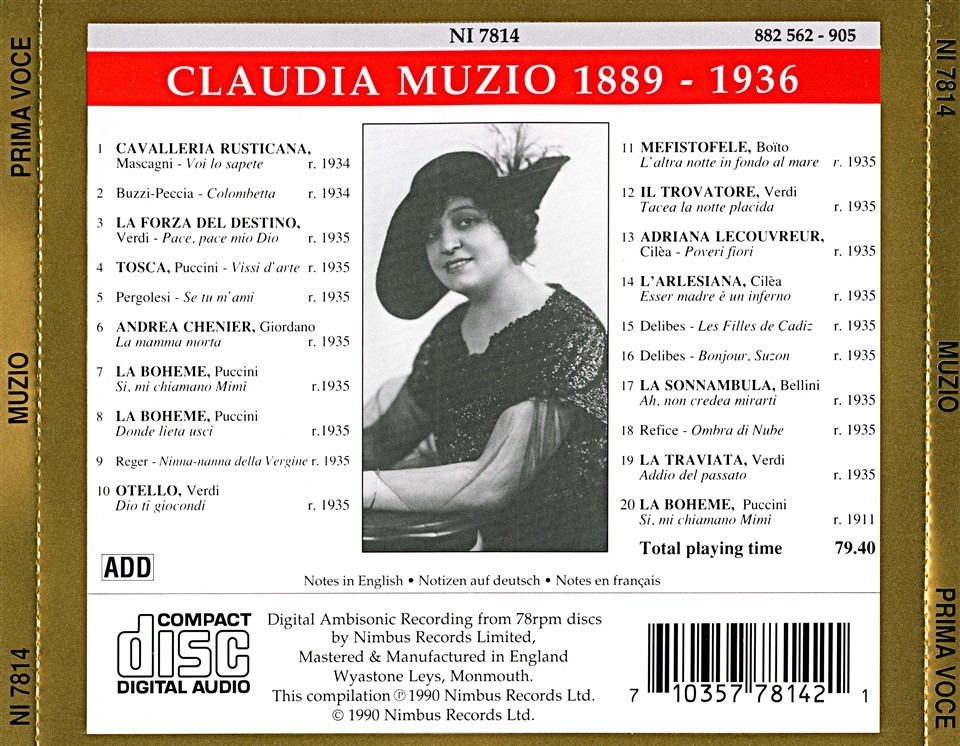Logowanie
OSTATNI taki wybór na świecie
Nancy Wilson, Peggy Lee, Bobby Darin, Julie London, Dinah Washington, Ella Fitzgerald, Lou Rawls
Diamond Voices of the Fifties - vol. 2
Tylko 1000 egzemplarzy!!!
DVORAK, BEETHOVEN, Boris Koutzen, Royal Classic Symphonica
Symfonie nr. 9 / Wellingtons Sieg Op.91
nowa seria: Nature and Music - nagranie w pełni analogowe
Petra Rosa, Eddie C.
Celebrating the art and spirit of music - vol. 3 - Pure
warm sophisticated voice...
Peggy Lee, Doris Day, Julie London, Dinah Shore, Dakota Station
Diamond Voices of the fifthies
Tylko 1000 egzemplarzy!!!
SAMPLER - STS DIGITAL, Buddy Tate, Milt Buckner, Walace Bishop
Jazz Masters - Legendary Jazz Recordings - v. 1
proszę pokazać mi drugą taką płytę na świecie!
Chesky! Niezmiennie perfekcyjny
Winylowy niezbędnik
ClearAudio
Double Matrix Professional - Sonic
najbardziej inteligentna i skuteczna pralka do płyt winylowych wszelkiego typu - całkowicie automatyczna
PRIMA VOCE, Claudia Muzio
Claudia Muzio 1911-1935

- 1 CAVALLER RUSTICANA, Mascagni, Voi lo sapete 3.28
- Rec: 19 April 1934 Matrix: BX 1337 Columbia Cat: LX 583
- 2 Buzzi-Peccia, Colombetta 2.17
- Rec: 1934 Matrix: BX 1338 Columbia Cat: 9084-M
- 3 LA FORZA DEL DESTINO, Verdi, Pace, pace mio Dio 4.50
- Rec: 4 June 1935 Matrix: BX 1358 Columbia Cat: LCX 26
- 4 TOSCA, Puccini, Vissi d'arte 3.00
- Rec: 4 June 1935 Matrix: B 6957 Columbia Cat: LB 40
- 5 Pergolesi, Se tu m'ami 3.10
- Rec: 1935 Matrix: BX 1377 Columbia Cat: LCX 635
- 6 ANDREA CHENIER, Giordano, La mamma morta 4.41
- Rec: 5 June 1935 Matrix: BX 1360 Columbia Cat: LX 655
- 7 LA BOHEME, Puccini, Si, mi chiamano Mim? 4.54
- Rec: 5 June 1935 Matrix: BX 1359 Columbia Cat: LX 583
- 8 LA BOHEME, Puccini, Donde lieta usci 3.04
- Rec: 4 June 1935 Matrix: B 6958 Columbia Cat: LB 40
- 9 Reger, Nina-nanna della Vergine 2.51
- Rec: 1935 Matrix: B 6985 ColumbiaCat: LC 22
- 10 OTELLO, Verdi, Dio ti giocondi 9.12
- with Francesco Merli (tenor)
- Rec: 1935 Matrix: BX 1371 Columbia Cat: LCX 32
- 11 MEFISTOFELE, Bo?to, L'altra notte in fondo al mare 4.10
- Rec: 6 June 1935 Matrix: BX 1363 Columbia Cat: LCX 25
- 12 IL TROVATORE, Verdi, Tacea la notte placida 3.42
- Rec: 5 June 1935 Matrix: B 6963 Columbia Cat: LC 21
- 13 ADRIANA LECOUVREUR, Cil?a, Poveri fiori 3.09
- Rec: 7 June 1935 Matrix: B 6966 Columbia Cat: LC 20
- 14 L'ARLESIANA, Cil?a, Esser madre ? un inferno 4.47
- Rec: 11 June 1935 Matrix: BX 1375 Columbia Cat: LCX 28
- 15 Delibes, Les Filles de Cadiz 3.03
- Rec: 1935 Matrix: BX 1373 Columbia Cat: LCX 29
- 16 Delibes, Bonjour, Suzon 3.09
- Rec: 1935 Matrix: B 6977 Columbia Cat: LC 19
- 17 LA SONNAMBULA, Bellini, Ah, non credea mirarti 3.59
- Rec: 6 June 1935 Matrix: BX 1361-2 Columbia Cat: LCX 27
- 18 Refice, Ombra di Nube 3.18
- Rec: 1935 Matrix: BX 1365-1 Columbia Cat: LCX 23 conducted by Licinio Refice
- 19 LA TRAVIATA, Verdi, Teneste la promessa....Addio del passato 4.47
- Rec: 6 June 1935 Matrix: BX 1364 Columbia Cat: LX 655
- 20 LA BOHEME, Puccini, Si, mi chiamano Mim? 4.09
- Rec: 20 June 1911 Matrix: 298ai HMV Cat: 053264 Conductor unknown
- PRIMA VOCE - serie
- Claudia Muzio - soprano
"Opera-lovers should not be without this disc." Ritmo Magazine, Spain "Anyone who hasn't yet made acquaintance with this extraordinary singer is in for a unique pleasure." Gramophone Claudia Muzio was one of those exceptional singers for whom the possession of one of the most beautiful voices in the world was not enough. For her, every word, every note of music and every physical gesture had to contain an emotional motive and meaning. Muzio dedicated her career to the achievement of these artistic aims. She was born on 7th February 1889 in Pavia, near Milan. Her father was a stage manager often involved in opera, and he worked both at Covent Garden and the Metropolitan. Her mother was a professional singer. Claudia's operatic début took place on 15th January 1910 as Massenet's Manon, and within two years she was in demand throughout Italy. La Scala invited her to perform the role of Desdemona in 1913 and this was followed by her Covent Garden début in 1914 as Puccini's Manon Lescaut. Other roles that same season included Marguerite in Boïto's Mefistofele and Mimì in La Bohème, with Caruso. Sadly, she never returned to Covent Garden. The Met. received her in 1916 as Tosca and she appeared there for the next seven seasons. She was also one of the most admired singers at the Chicago Opera from 1922 to 1932. Like most of the great Italian opera stars of the period, she frequently performed in South America where she enjoyed enormous success. She returned to Italy in the early 1930's, performing at the Rome Opera. After a short illness she died on 24th May 1936. The selection of Muzio's recordings on this compilation covers her entire career. Her first record made for the Gramophone Company in 1911 is included here; it shows a young, immature soprano voice but gives an indication of what was to come. By the time that Muzio recorded for Columbia in 1934/35 she had lost the youthful freshness of voice but had gained enormous qualities of colour and inflection. On these recordings we are treated to an experience in human terms almost unequalled in the history of recorded sound. The pathos of the dying Violetta in La Traviata, the heart- rending Marguerite in Mefistofele, the poignancy of the Refice song Ombra di Nube, and the tenderness of Mimì's Addio, are all vividly caught. We can see the lighter side of her character in her performances of Colombetta and Bonjour Suzon. © 1990 Norman White





























